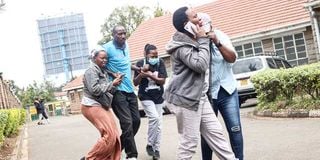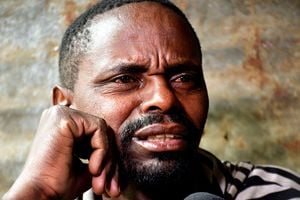Conflicting death toll, pain and agony as families search for their loved ones

Different authorities and agencies have given varied figures of the people who died during the countrywide anti-Finance Bill, 2024 protests on Tuesday.
There are reports of at least 53 Kenyans dying but President William Ruto put the number at six.
The Bill was withdrawn yesterday evening, with the President saying he had listened to the people and decided not to sign it into law.
Before the pronouncement, many families wept bitterly following the killing of their loved ones during the demonstrations in Nairobi and many parts of the country.
At the City Mortuary in Nairobi, tens of desperate families showed up in search of their children who went missing from Tuesday afternoon when all hell broke loose at Parliament Buildings and later on at night, in Githurai where gunshots rent the air for hours.

According to the Police Reforms Working Group, at least 30 deaths were recorded in Githurai after the demonstrations.
In a statement yesterday, the group said police officers shot people, adding that the “massacre started at 10 pm”.
“In Githurai alone, police killed at least 30 innocent people at night. More than 100 are nursing gunshot wounds,” the statement said.
“We believe the massacre was fuelled by an inciting and ignorant address President Ruto gave at State House yesterday.”
A total of 53 people were arrested and at least 17 others were abducted in Nairobi alone.
The group said police officers had no reason to use force, including live ammunition and snipers, against demonstrators.
At least 20 security officers were injured during a row with protesters in the same area.
Three police vehicles were burnt and vandalised during the day-long demonstrations against the Finance Bill, 2024 described by economists, businesses and ordinary Kenyans as punitive and insensitive.
The demonstrations took place mostly on Thika Superhighway and turned chaotic when police officers lobbed tear gas at the protesters, leading to running battles.
According to Githurai and Kasarani police, protesters numbering around 6,000 lit a fire on the road and turned down the police commander’s request to disperse. The report adds that the crowd began pelting the officers with stones.
“Tear gas was fired to disperse them but the protesters overpowered the officers who withdrew,” the report says.
“The crowd blocked the road with an electricity pole, cut off a police vehicle from the convoy and burnt it. Two other police pick-up trucks were vandalised.”
It adds that as the officers retreated, the “rioters” followed them to Githurai Mwiki police station.
“They wanted to overrun the station but were overpowered and retreated,” the police report says.
Police chiefs said the injured officers were treated and discharged.
They praised police officers “for their efforts in defending the country” and said the national security agencies would implement measures that would thwart any attempts to undermine Kenya’s stability.
In his Tuesday night address to the nation, President Ruto lauded young people for their role in organising a democratic discourse around critical national issues and stressed the need to distinguish criminals and peaceful demonstrators. The short speech began at 9 pm.
A few minutes later, reports of shooting in Githurai started emerging.
In the aftermath of the bloodbath on Tuesday, Kenyatta National Hospital (KNH) reported admitting 165 patients with many types of injuries sustained during the protests in Nairobi.
Among those taken to hospital were two young men who were pronounced dead on arrival.
Another died while being treated.
KNH Acting Director of Surgical Services Benjamin Wabwire said 72 patients had been discharged and 24 others operated on by yesterday noon.
“We received our first patient on Tuesday at 11 am and closed the day with 165 admitted. About eight patients are undergoing surgery while 23 are on the waiting list for additional procedures. The hospital prioritised those in critical condition,” Dr Wabwire told the Daily Nation.
He added that the injuries range from blood trauma and soft tissue to gunshot, with many being from rubber bullets.
About six injuries were from live bullets and 20 from rubber bullets, he said.
Many of the injured were from the daytime protests in the capital city and were taken directly to KNH from the makeshift medical centres or referrals from other institutions.
“There was an influx, mostly from Githurai, at night. There were about 15 patients from there,” he said.
The growing number of casualties made hospital authorities to activate and enhance the emergency response team so as to handle the dire situation, including a desk to aid families trace relatives.
One patient had not been identified by the time of going to press yesterday.
In Mombasa, Emmanuel Giggs Tata, 20, was among the thousands of young people who took part in the marches against the Finance Bill, 2424.
Unfortunately, the young man never made it back home.
Samson Mwasa Nzamba, said tragedy struck just as his cousin was about to return home.
A tear gas canister fell near Tata and exploded. Tata inhaled the noxious smoke and struggled to breath.
“Police officers lobbed tear gas canisters from both sides after having us cornered. Giggs could no longer walk and told me that he had difficulties in breathing,” Nzamba said.
According to Tata’s father, Paul Tata, his son had just arrived home from Meru National Polytechnic.
The elderly man said he was in the process of raising his son’s fee as studies resume next month.
“I ask President William Ruto to talk to these young people. Raising Giggs and his sister has been a big struggle. I did all I could to give him a decent education and now this has happened,” a distraught Mr Tata said yesterday adding that he named his son after former Manchester United FC legend Ryan Giggs.
“Giggs was my son and my friend.”
The family requested the help of the government and well-wishers to give Tata a befitting sendoff.
Just like KNH, the Coast General Teaching and Referral Hospital in Mombasa, received and admitted several people with gunshot injuries.
Sources at the hospital told the Nation that by Tuesday evening, one individual had been pronounced dead while another was still in the Intensive care Unit.
About nine others are nursing severe gunshot wounds.
“They had gunshot wounds in the neck, hand and other parts of the body. The severity of injuries depended on where they were shot,” an official at the hospital said, requesting anonymity for not having the authority to comment publicly on the matter.
One of the patients admitted to the hospital and who requested not to be named said one bullet hit him in the arm.
His phone, which was in the pocket, took the impact of the second bullet. He produced the phone which still had bullet fragments.
Mr Jonah Shikoli, 21, was shot in the back but survived.
“I was in a lot of pain when Good Samaritans brought me here yesterday but I now feel better,” said Shikoli, a beautician and cosmetologist in Mombasa.
“I am waiting to be taken back to the theatre to have a bullet removed from my body. I cannot explain why police officers were using live bullets on peaceful demonstrators. I only pray for peace in Kenya.”
He said that another young man he was with, in the ambulance on their way to hospital was pronounced dead on arrival.
At the time of being the interview, Mr Shikoli was on an underwater seal chest drain, a system that helps remove fluids that have accumulated near the lungs to help the patient breathe.
In another ward at the referral hospital, Mr Silas Oliech, 30, said he was going home after looking for work when he encountered protesters and police.
Oliech and another man in the ward who did not want to be identified, were shot in their arms.
“I was running away as people were engaged in battles with police officers in the City Centre. The police shot at us, hitting my arm. I am in pain but feel better because the bullet has been removed,” the mason from Changamwe said.
Human Rights Agenda, an NGO in Mombasa, said about 15 young people were injured in the Finance Bill, 2024 protests on Tuesday.
Mombasa Governor Abdulswamad Nassir visited the patients at the hospital.
He said his administration would waive the medical charges for the protesters.
The Independent Policing and Oversight Authority yesterday said it has launched investigations into the many incidents reported during the Tuesday mass protests.
The authority has launched investigations into the deaths of Rex Masai, 29, and Evans Kiratu, 21. Masai died on June 20 and while Kiratu succumbed to injuries at KNH the following day.
Rights organisations, activists, the Law Society of Kenya and other agencies blame police for the two deaths.
Reporting by Steve Otieno, Hillary Kimuyu, Lilys Njeri, Jurgen Nambeka and Karim Rajan





